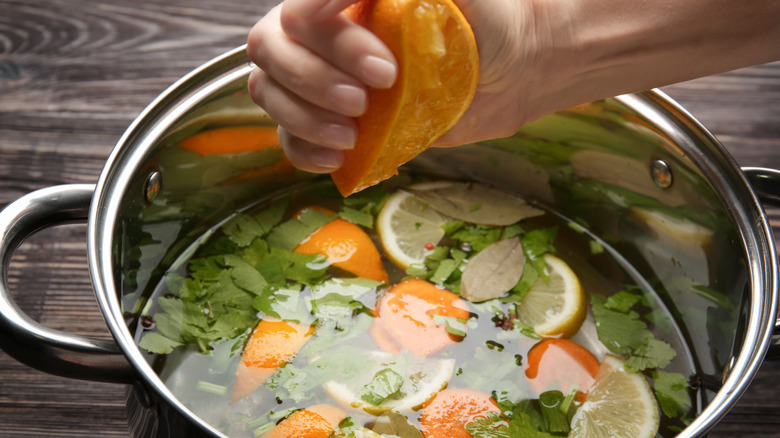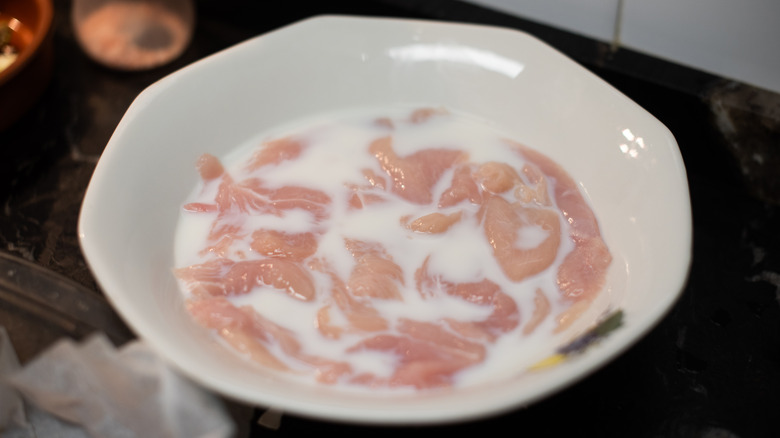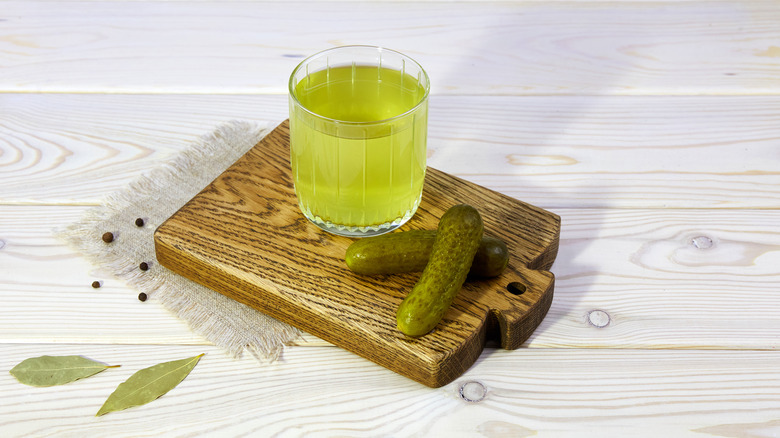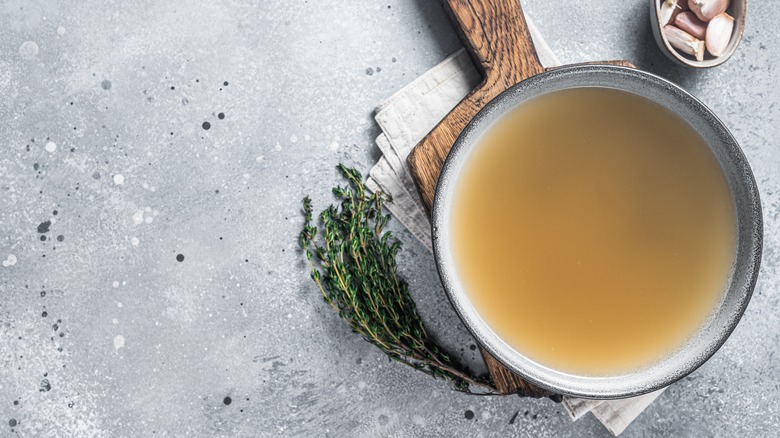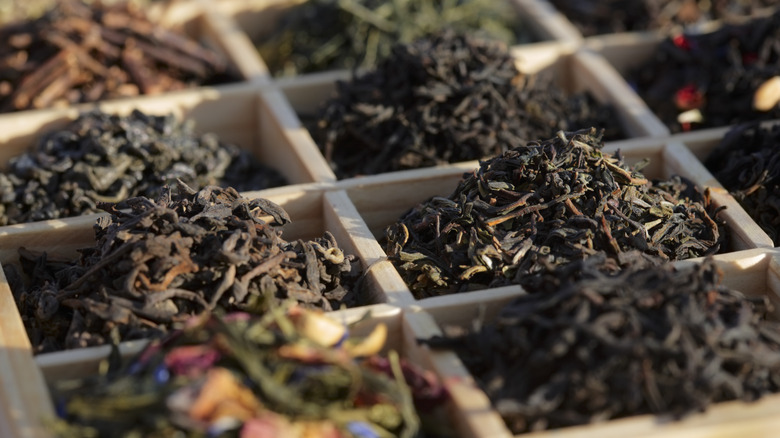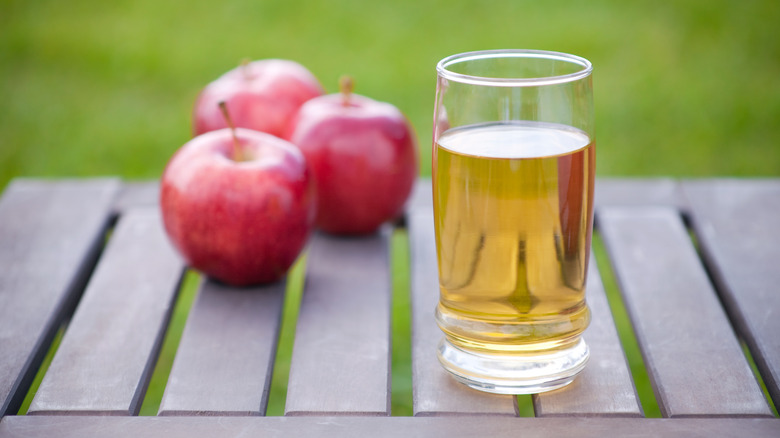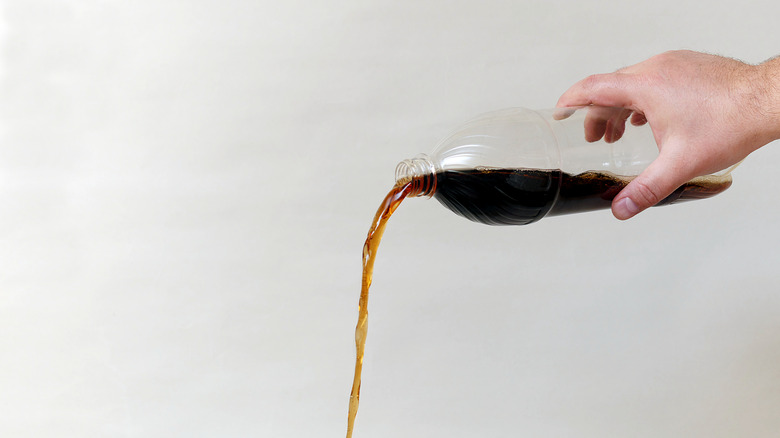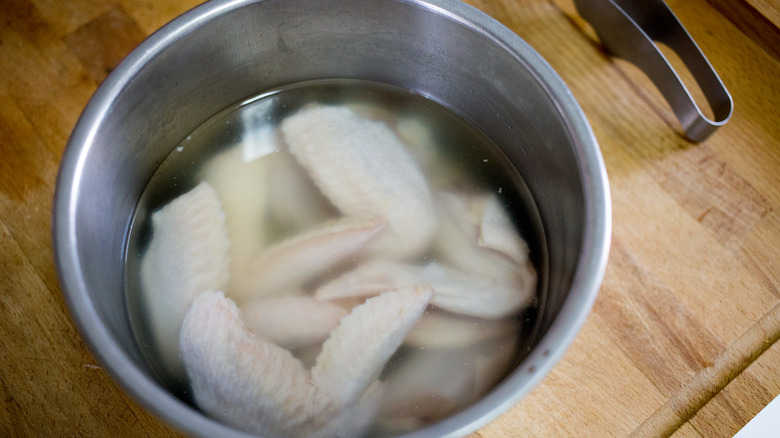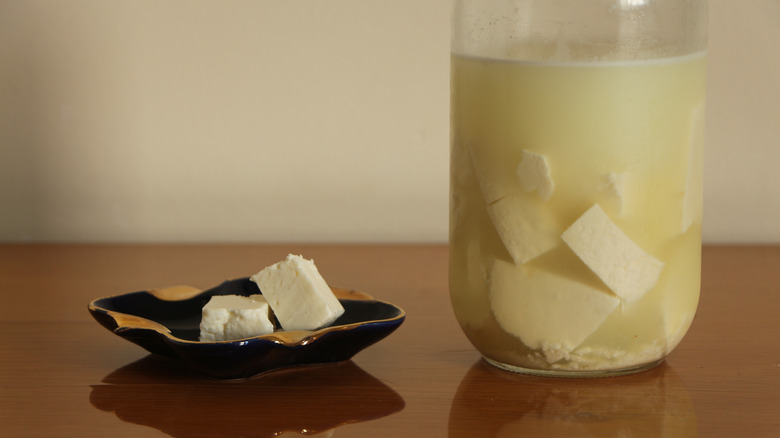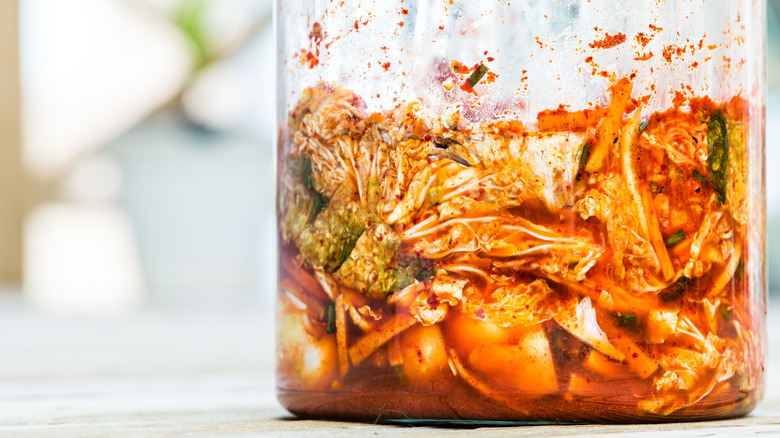12 Best Liquids For Brining Chicken
Chicken is one of the most popular types of meat around the world, but that doesn't mean it's the easiest to cook. As white meat, chicken is prone to drying out fast, and can become tough and stringy. Its gentle flavor may give it an enviable versatility, but it also means that unless it's prepared well, it can end up being pretty tasteless.
That's where brining comes in. An ancient preparation method, brining involves soaking meats like chicken, fish, turkey, or beef in a liquid, and giving it time for that liquid to permeate the meat's proteins. In doing so, it gives the meat additional moisture, adds flavor, and makes it more tender. Brining is related to marinating, a similar process of soaking meat in a flavorful concoction, but it has a slightly different primary intention. While marinating focuses mainly on adding extra taste to meat, brining's main goal is to give it moisture.
Brining solutions can be simple concoctions combining salt, water, sugar, and just a few flavorings. But there are also plenty of liquids out there that work excellently as brining solutions that you might not suspect, and which can add totally unique flavors to chicken — and some of them might be sitting in your refrigerator or your cupboard this very second.
1. Milk
Combining milk and chicken might not be your first instinct, but we urge you to give it a try. Brining chicken in milk is especially effective at creating extra moisture and tenderness due to the liquid's composition. Milk, as we all know from our school days, contains calcium, and this calcium reacts with the chicken's enzymes when the two are combined. This helps the chicken to gently tenderize, while also soaking up all of the moisture in the milk.
The calcium is helped by the lactic acid that exists in milk, which assists in further softening the chicken. And the liquid also has a few extra attributes that make it well-suited to the meat. Milk has a gentle, neutral flavor, which pairs well with the natural mildness of chicken, and stops it from overpowering the taste of the meat. It also works brilliantly as a base for other, stronger flavors, as it does in buttermilk fried chicken, where the dairy flavors help to highlight the spicier, saltier notes. Brining chicken in milk is also a great choice if you're using especially fiery flavors in your eventual dish and don't want them to be too powerful, thanks to the casein helping to temper the spice.
2. Pickle juice
If you haven't used pickle juice to brine your chicken yet, you're missing out. Anyone who's tried pickle-brined fried chicken will be able to tell you that using pickle juice gives your meat a boost of flavor and a serious salty sourness. Pickle juice is primarily made with vinegar, water, and salt, with additional flavors added in. While this makes it similar in structure to the standard salt-and-sugar solution you make at home to brine your Thanksgiving turkey, the added vinegar works to gently tenderize the meat.
The added spices, and the flavor of the pickles themselves, also give pickle juice an extra kick of flavor — and as pickle juice has had time to develop while the pickles soak, this flavor is often way more developed and nuanced than we give it credit for. Using leftover pickle juice as a brine is also a great idea from a food waste perspective, and stops you from pouring it all down the sink. If you don't have a large amount of pickle juice to use, even just a little bit added to a regular brine will give it a kick of extra flavor. You can also mix it into buttermilk, for a sour, creamy brine.
3. Chicken broth
If you want your chicken to taste like, well, chicken, this brine is the way to go. Chicken broth is a natural choice for brining chicken, thanks to its inexpensive nature, its saltiness, and its inherent savory flavors. The salt in chicken broth helps the moisture to get into the meat more effectively, and these broths are often flavored with herbs and well-chosen spices that give any meal immediate depth, and which takes the work of trying to figure out quantities of aromatics in a DIY broth out of the equation.
Chicken broth is especially effective at boosting the umami levels in your chicken, giving it a more well-rounded flavor. A study conducted by Knorr in association with Kantar found that when chicken was brined with chicken broth, almost all of the chefs who used it found that their eventual dish had way more umami (per Unilever Food Solutions). The vast majority of chefs also found that broth-brined chicken made all of the other flavors in a meal richer and punchier. They also found that they achieved this effect by using just a small amount of broth powder in a brine. For the best results, it's advisable to submerge your chicken in as much broth as possible.
4. Tea
Tea may seem like an out-there choice for a brine, but its unique structure makes it a particularly effective choice. The majority of teas (apart from herbal ones like ginseng, jasmine, and ginger) have tannins in them. These are chemical compounds that are also found in wine, and which give tea both its darker color and its slightly bitter taste. But these tannins also have an effect on the proteins in chicken and can help to tenderize the meat, while also imparting and boosting flavor. The liquid content in the tea, meanwhile, helps to keep the chicken moist.
As different types of tea can taste pretty different, the type you use will inevitably have an effect on the flavor of your chicken. Darker, stronger-flavored teas will produce more of a pronounced taste, while more floral-focused teas like Earl Grey will add delicacy and variation to your meal. If you want to make your chicken really interesting, try steeping whole spices in the tea, allowing them to infuse before adding your meat. Bear in mind, too, that like other brines, you'll need to leave your chicken in your tea solution for a good amount of time for it to achieve maximum flavor. Let it soak at least overnight, and for up to 24 hours if you have the time.
5. Beer
Beer doesn't just go well with chicken — it works inside it, too. A beer brine has some distinct advantages over other liquid brines, thanks to its light alcohol content. Alcohol reacts positively with fat and works to permate the fats in chicken meat, making everything way more moist. The water content of beer, meanwhile, also helps to keep the meat juicy and tender and also stops the alcohol from reacting too harshly with the chicken's protein, inadvertently causing it to toughen up and begin converting to a cooked state. Importantly, diluting stronger beers with water will help to prevent this.
Beer also has a unique, complex flavor, that's all too often missed when it's being drunk casually. It has a maltiness and a slight sourness that other brines find difficult to replicate, and which work superbly with the natural flavors of chicken. Different types of beers will give a different taste: Stronger ales will be meatier and denser, whereas lagers or pilsners will have more of a lightness to them. It's useful to combine beer with other aromatics in brine, like onions and garlic, to make sure you're getting a well-rounded flavor profile. Remember to add salt to your brine, too, to highlight the notes in the beer properly.
6. Apple juice
Apple juice isn't just for drinking, folks. This classic morning beverage can also work effectively as a brine. With its high 88% water content, apple juice provides the moisture that chicken brines need to imbue the meat with juiciness. As the rest of apple juice is predominantly made up of sugars, it provides ample sweetness and helps to impart a gently floral taste to your chicken.
It can be helpful to balance the flavors in apple juice brine with a good amount of salt and other aromatics so that your chicken doesn't end up too sweet or one-note. As it's naturally acidic, apple juice also has a tenderizing effect on meat — although it's important to be careful with which one you choose, as too much acidity can turn your chicken to mush. Tart apple juices can be sharper and more acidic than those made with certain types like Delicious or Golden Delicious apple varieties. The best thing to do is to give it a taste test. If your apple juice tastes too sharp, dilute it with some water, and add more flavor to the brine by pouring in more salt and sugar.
7. Coca-Cola
Coca-Cola has way more uses in the kitchen than you might think. As well as being at home in glazes and braising solutions (and also part of our favorite cleaning hacks), Coke is also awesome in a brine. Coca-Cola has a tenderizing effect on chicken and other types of meat, thanks to its low pH level of 2.6-2.7. This acidity has a deconstructive effect on protein molecules, breaking down the amino acids to make the formerly tough cells soft and moreish.
Coca-Cola also provides plenty of taste in every sip, thanks to its high levels of sweetness and caramelized, slightly spicy flavor notes. When used in brine, all of this ends up in your chicken, giving it a deep, mellow flavor. Crucially, though, you shouldn't brine your meat in Coke for too long. The longer that chicken hangs out in a Coca-Cola solution, the more the proteins break down, and if left for long enough, they will completely disintegrate. We would recommend always cutting your Coca-Cola with a good amount of water (which is alkaline when from the tap, with a pH level of 7.4) to stop it from destroying your meat. Alternatively, only brine your chicken for a short window.
8. Salt and sugar water solution
Why mess with the best? There are plenty of reasons why the classic brine recipe for chicken and other poultry, combining simply salt, sugar, and water, has been around for so long. Salt-sugar-water solutions are easy to make and use readily available, cheap ingredients that you'll usually have somewhere in your home. Their core ingredients provide exactly what you need from a brine, with the salt working to simultaneously soften the meat and season it from within, while the sugar provides flavor and helps the chicken caramelize when it's cooked. The salt also causes the chicken to soak up the water in the brine, helping to safeguard against moisture loss when it's cooked.
Ideally, you'll want to aim for between a 10:1-20:1 ratio of water to salt — so, if you're using a liter of water, use between 50-100 grams of salt, and slightly less sugar. It's advisable to use a lower-concentration brine if you're planning to soak your meat for longer periods so that it doesn't absorb too much salt. You can use pretty much any salt you have to hand in your brine, and it's best not to use your most expensive kind — save that for seasoning your chicken at the end. Remember, too, that a salt-sugar-water solution is the perfect foundation for any and all herbs, spices, or vegetables that you also want to include for extra flavor.
9. Wine
Wine has many functions for food beyond just accompanying it, and one key function is its use in brining solutions. Well-made wines have incredibly developed flavors, and depending on the wine you choose, can provide fruity, tangy, or even meaty notes. Using white wine in a brine can give your chicken a crisp, citrusy edge, while a full-bodied red can give your meat a bold color and chocolatey or cherry-like flavors. The alcohol in the wine will also help to break up the fats in the chicken, making everything way juicier and easier to eat.
Wine is also acidic, which will assist in tenderizing the tougher parts of the chicken, although like other acidic liquids, you'll want to dilute them with water. Importantly, you should always try and align your other flavor elements with the wine you're using. If you're going for a fruity Riesling or a Moscato, throw in some orange and apple slices, to amp up the zestiness. If, on the other hand, you're using a spicy Syrah or Grenache, pair this with some cloves, allspice, or juniper berries. As an added bonus, you can then pair the wine you used in your brine with the chicken during your meal.
10. Feta brine
Feta commonly comes packed in brine, and that brine usually ends up being poured away once you're done with the cheese. But in our view, it should be put to good use. Marinating or brining chicken in feta cheese is a little-known, but effective trick to create juiciness and flavor. Feta brine is, essentially, a more flavorful and developed version of a regular salt-water solution, with the cheese giving it a creaminess and light sourness that works excellently with chicken. The more aged your feta is, the more pronounced the taste of the brine will be.
Feta brines are especially effective as the sheep's milk cheese is abundant in calcium and lactic acid, both of which have a softening effect on the chicken. And if you can't wait to get through your cheese to use its brine, you're in luck. You can use the already-flavorful brine, and create a replacement one for your feta using a simple salt-water solution so that it doesn't dry out in the fridge. We would recommend pairing feta-brined chicken with similar flavors when you cook it, for example by stuffing it with feta, spinach, and pine nuts.
11. Kimchi juice
Anyone who's tried kimchi will know that its flavor is unlike nothing else out there, with a combination of sweetness, spice, funk, and salt that's totally moreish. And all of those flavors can be put to good use once you've finished the jar, by utilizing its brine for chicken. Brining your fried chicken in kimchi has a similar effect to using a pickle brine but with even more complexity and punch. Kimchi is made using spicy gochugaru flakes, garlic, fish sauce, dried shrimp, and ginger, and when it's all fermented with the vegetables used, it creates a spicy and deeply flavored juice.
The fermentation process also produces lactic acid. This has slightly less tartness than the raw vinegar used in pickle juice but still works as a tenderizer for the meat. This is helped by the high salt content of kimchi juice, which helps the chicken draw in liquid more effectively. Kimchi juice can be diluted with another solution, like buttermilk, which can add more flavor notes and also help to tone down its spice. Just remember that ideally, you'll only want to use kimchi juice from a jar that's almost finished. Removing it can cause the vegetables in the solution to dry out and lose flavor.
12. Orange juice
Orange flavors pair superbly with chicken, which makes orange juice a natural choice in sauces and marinades. But it can also give your brines a boost. Orange juice gives sweetness and tartness to chicken brines, and its acid levels can make the meat way more succulent. The sugars in orange juice will also help the chicken develop a sweet browned crust when it's cooked, and all of that flavor will soak deep into the chicken flesh, removing the risk of a bland, dry meal.
Orange juice should always be diluted with water when used in a brine, so as not to denature the protein too much and break it down. As orange juice can be quite sweet, make sure that you include ample amounts of salt in your brine — remember, you'll want your final meal to have savory notes as well as sweet ones. Orange juice works especially well with herbal flavors, like rosemary, thyme, and parsley. Stirring a bouquet garni into your orange juice brine can give it further flavor notes, and cut through the juice's sweetness effectively.
